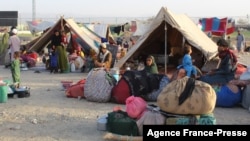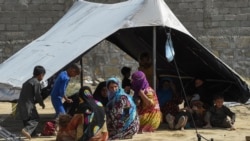The Taliban takeover of neighboring Afghanistan in August forced more than 300,000 Afghans to take shelter in Pakistan but now most of them are being asked to go back.
Pakistani officials revealed the numbers Thursday for the first time, saying 105,000 Afghans entered Pakistan on valid visas, though they have stayed put even after the expiry of their travel documents.
“The rest of the 200,000 are illegal entrants and we are asking them to leave within 90 days as there is no crisis in Afghanistan,” Fawad Hussain, the Pakistani information minister, told VOA.
The minister noted his country already hosts nearly 3 million Afghans, including officially declared refugees and illegal economic migrants, and that the fragile Pakistani economy cannot bear the burden of new arrivals.
Pakistan, which shares a 2,600-kilometer border with its neighbor, tightened border controls after the Taliban seized power in Afghanistan on August 15 in a bid to discourage a fresh influx of refugees.
Officials said the large numbers of Afghans who arrived in the country illegally used old refugee status cards or documents declaring them as members of the tribes divided by the 1893 British demarcation of the border.
Mohammad Sadiq, Pakistan’s special representative for Afghanistan, said the government was devising a mechanism to enable those Afghans whose visas have expired to get their documents renewed within an officially "designated time frame so they are not here illegally.”
Sadiq told a meeting Wednesday of Pakistani and Afghan businessmen and civil society representatives earlier this week in Islamabad that his government does not plan to launch a crackdown on the illegal Afghan entrants if they are not involved in any criminal activity.
“We would even like to facilitate the stay of our Afghan brothers and sisters in case they want to live or do business here legally,” Sadiq told the gathering organized by the Islamabad-based Center for Research and Security Studies.
Afghans cross border illegally
International aid agencies estimate more than 300,000 Afghans, including women and children, also have illegally crossed into neighboring Iran since August 15 when the Taliban seized control of the Afghan capital, Kabul.
Many families in Afghanistan are desperate to leave the country where the worst nationwide drought in decades, high levels of poverty, growing unemployment and years of war have increased humanitarian needs to unprecedented levels this winter.
In addition, fears of Taliban revenge reprisals have prompted Afghans affiliated with the deposed Western-backed government to try to leave the country.
The humanitarian crisis has worsened in the wake of financial sanctions the United States and Western countries have imposed on the Taliban government, paralyzing the Afghan banking system.
Financial assistance stops
Foreign donors have halted most financial assistance. The punitive measures stemmed from terrorism and human rights concerns under the Taliban rule.
The United Nations World Food Program estimates the number of severely vulnerable people in Afghanistan is a staggering 22.8 million, more than half of the population. About 9 million of them “are one step away from famine-like conditions” and 95 percent of Afghan households are unable to feed themselves sufficiently daily.
Pakistan will host a special meeting Sunday of foreign ministers of Islamic countries to mobilize support for providing food, medicine and housing to millions of people in Afghanistan. It is part of an effort to prevent the influx of Afghan refugees to neighboring countries.
Officials in Islamabad say the Taliban and representatives from the United States, Russia, China, Britain, France, the United Nations and European Union also have been invited to the “extraordinary session” of the 57-nation Organization of Islamic Cooperation, or OIC.





